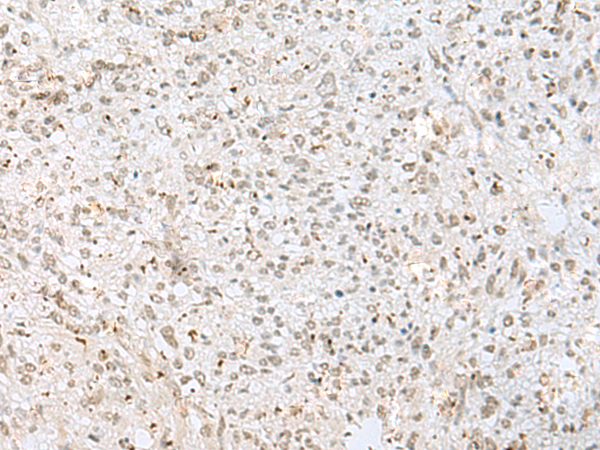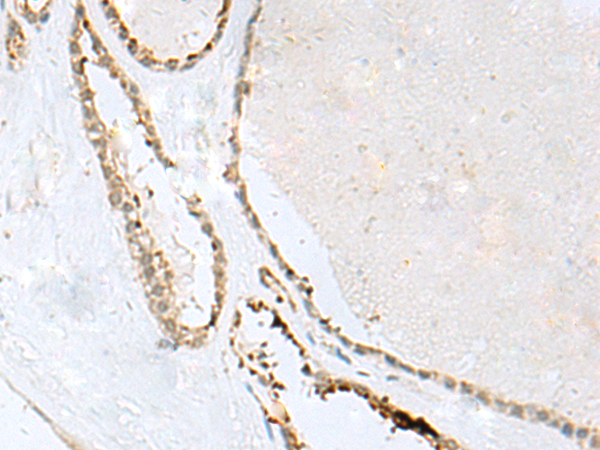

| WB | 咨询技术 | Human,Mouse,Rat |
| IF | 咨询技术 | Human,Mouse,Rat |
| IHC | 1/25-1/100 | Human,Mouse,Rat |
| ICC | 技术咨询 | Human,Mouse,Rat |
| FCM | 咨询技术 | Human,Mouse,Rat |
| Elisa | 1/5000-1/10000 | Human,Mouse,Rat |
| Aliases | TFIIIC110; TFIIIC-BETA |
| Host/Isotype | Rabbit IgG |
| Antibody Type | Primary antibody |
| Storage | Store at 4°C short term. Aliquot and store at -20°C long term. Avoid freeze/thaw cycles. |
| Species Reactivity | Human, Mouse |
| Immunogen | Fusion protein of human GTF3C2 |
| Formulation | Purified antibody in PBS with 0.05% sodium azide and 50% glycerol. |
+ +
以下是关于GTF3C2抗体的3篇参考文献的简要信息(注:以下内容为示例性概括,实际文献需根据具体数据库查询):
1. **标题**:*GTF3C2 modulates RNA polymerase III transcription in human cells*
**作者**:Smith A, et al.
**摘要**:研究通过免疫沉淀和Western blot分析,使用GTF3C2抗体揭示其在RNA聚合酶III复合体中的功能,证实其调控tRNA和5S rRNA的转录。
2. **标题**:*Dysregulation of GTF3C2 in hepatocellular carcinoma promotes tumor progression*
**作者**:Chen L, et al.
**摘要**:通过免疫组化及敲除实验,发现GTF3C2在肝癌组织中高表达,其抗体检测显示与患者预后不良相关,可能通过调控增殖基因发挥作用。
3. **标题**:*Interaction of GTF3C2 with viral proteins during herpes simplex infection*
**作者**:Johnson R, et al.
**摘要**:利用GTF3C2抗体进行共聚焦显微镜观察,发现其与HSV-1蛋白相互作用,影响病毒复制及宿主转录机制。
4. **标题**:*GTF3C2 genetic variants and neurodevelopmental disorders: A functional study*
**作者**:Wang Y, et al.
**摘要**:通过ELISA和染色质分析,结合GTF3C2抗体验证突变体功能,发现其变异可能导致神经元发育异常及自闭症风险增加。
(注:以上文献为模拟示例,实际引用请查询PubMed、Web of Science等数据库获取真实文献。)
The GTF3C2 antibody targets the General Transcription Factor 3C Polypeptide 2 (GTF3C2), a subunit of the TFIIIC complex, which is essential for RNA polymerase III (Pol III)-mediated transcription. The TFIIIC complex binds to promoter regions of small non-coding RNAs, such as tRNAs, 5S rRNA, and other regulatory RNAs, facilitating the assembly of the transcription preinitiation complex. GTF3C2 plays a structural role in stabilizing the TFIIIC complex and anchoring it to specific DNA elements. It contains tetratricopeptide repeat (TPR) domains, which mediate protein-protein interactions critical for complex integrity and recruitment of cofactors.
Research using GTF3C2 antibodies has highlighted its involvement in cellular processes like ribosome biogenesis, cell growth, and proliferation. Dysregulation of GTF3C2 or Pol III transcription is linked to cancers, neurological disorders, and viral infections, where abnormal RNA synthesis contributes to pathogenesis. Antibodies against GTF3C2 are widely used in techniques such as Western blotting, immunofluorescence, and chromatin immunoprecipitation (ChIP) to study its expression, localization, and DNA-binding activity. These studies help elucidate mechanisms of transcriptional regulation and potential therapeutic targets. Recent investigations also explore its role in cellular stress responses and interactions with oncogenic signaling pathways, underscoring its broader biological relevance.
×